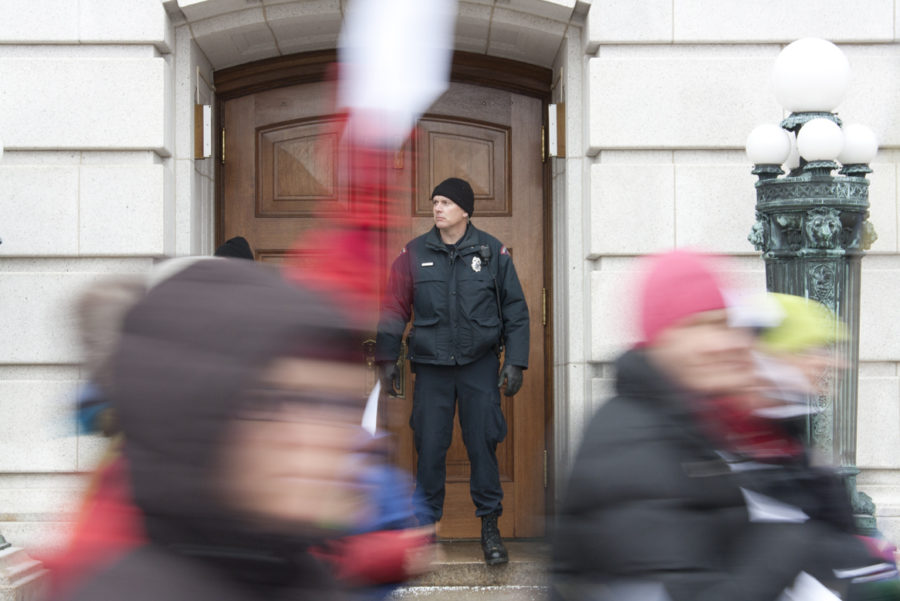Opoien: Scott Walker’s attack on rights is an injury to all
February 22, 2011
“Get. In. Or get. Away.”
The hushed plea came from the window of a ground-floor office in the Wisconsin State Capitol as we hovered nearby, peering at the signs plastered to it. It was about 11:30 p.m. Sunday, and temperatures dipped into the low 20s — though it felt much colder.
Nearby, people huddled near a locked door, making phone calls and searching for a way in.
“Get in, or get away.”
The voice belonged to a man who had slightly opened the window. I turned to Iowa State Daily photo editor Kelsey Kremer and Daily news editor Matt Wettengel and said, “Let’s go.”
Once we had crawled inside, the man instructed us to take off our coats so it wouldn’t look like we had just come in, and told us how to get past the security guards we might encounter outside the dark office. None of us were prepared for what we saw once we emerged.
Signs protesting Gov. Scott Walker’s “budget repair bill” covered the entire rotunda and spread into additional wall space. Some were clever, some were angry, some smacked of desperation. People were arranged in clusters: families, friends and people who had just met.
Groups such as the University of Wisconsin-Madison Teaching Assistants’ Association and the American Federation of State County and Municipal Employees hosted information booths, and an entire wing was dedicated to the food, bedding and toiletry donations that poured in. It was a community.
A call soon sounded from the center of the rotunda. A young man announced there was a group of people outside who had been told it would be midnight before the Capitol would close, but they were now locked out. He requested 20 coats and blankets, which he had been given permission to hand out to them.
The man was Damon Terrell, junior at University of Wisconsin-Madison. He told us later that when the group was eventually allowed inside, all the coats and blankets were returned to their owners.
That sense of peace and community was echoed within the walls of the Capitol and, later, throughout the square outside; from the signs that read, “Remember, this is a peaceful protest,” to the fact that no arrests have been made related to the protests.
But make no mistake, the peace was not for lack of passion.
“The biggest thing that irks me is when [Walker] says, ‘It’s a modest request.’ This is modest? Asking for our rights? How could that be modest?” said Silke O’Donnell, child care representative with American Federation of State County and Municipal Employees Child Care Providers Together in Madison.
Sunday was O’Donnell’s second night sleeping in the Capitol. She fears that if the bill is passed, public employees will no longer have a collective voice. She brought her children to the Capitol because she wants them to learn that they have the right to speak their minds, and that it can be done peacefully; and because she sees the far-reaching implications of taking away collective bargaining rights.
“It’s not about us anymore. It’s not about my rights or what we’re fighting for. It’s about these kids’ rights, and our grandchildren’s rights, that can’t be taken away. That’s what I’m here fighting for,” O’Donnell said.
Some stayed the night simply so others could, too. Debra Dawidziak, 28, of Madison, heard talk that the Capitol would close at night if enough people didn’t show up. In addition to her personal objections to the bill, she knows protesters need to work together to make their voices heard. Mary Jo Walters, mother of two, was there for the same reason.
As a Wisconsinite, I have a personal connection to what’s happening in my home state.
As an American citizen, you do, too.
This isn’t just about public employees in Wisconsin. What happens in the Badger State will set the tone for the rest of the nation. Eliminating collective bargaining will not save Wisconsin from its deficit — which Walker increased by $120 million for 2011 to 2013, with the tax breaks he signed during a special session.
Walker’s attack on collective bargaining is not about balancing the budget. How can it be, when according to American Rights at Work and the Center for Budget and Policy Priorities, eight states without collective bargaining now face a larger budget shortfall than Wisconsin?
This bill is about breaking unions. It is about taking away workers’ rights to negotiate for safe, fair working conditions — rights that benefit non-union employees, too. It is about taking away their voice.
And it’s happening in other states. Collective bargaining rights are on the chopping block in Ohio, New Jersey, California, Indiana, Michigan, Nevada, Iowa and elsewhere, despite the fact that 61 percent of Americans would oppose a law in their state similar to Walker’s proposal in Wisconsin, according to a recent USA Today/Gallup poll.
Yesterday, worker solidarity rallies were held in at least 33 states. As the Wobblies say, “An injury to one is an injury to all.”
Scott Walker’s attack on rights is an injury to this nation.

















